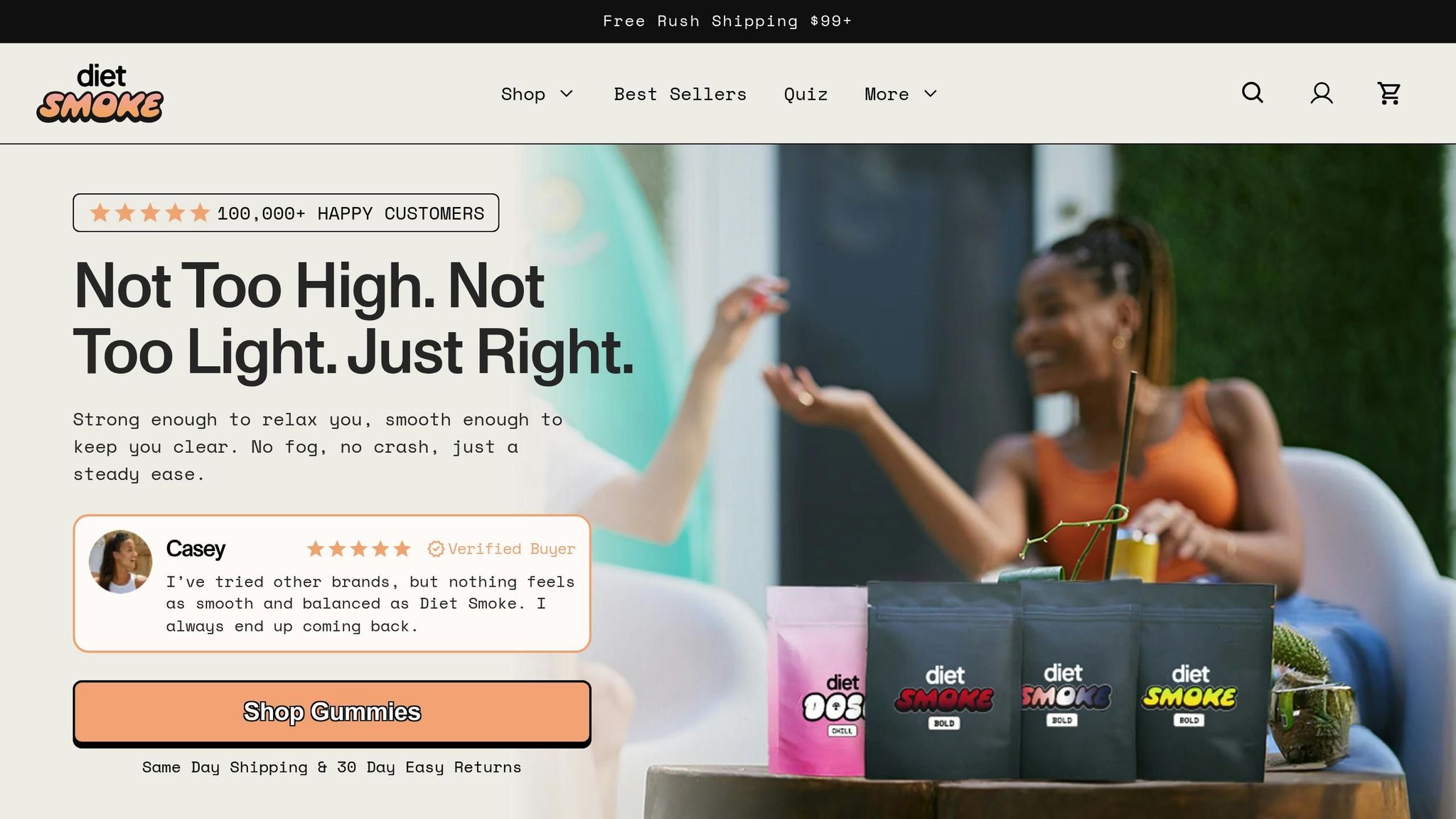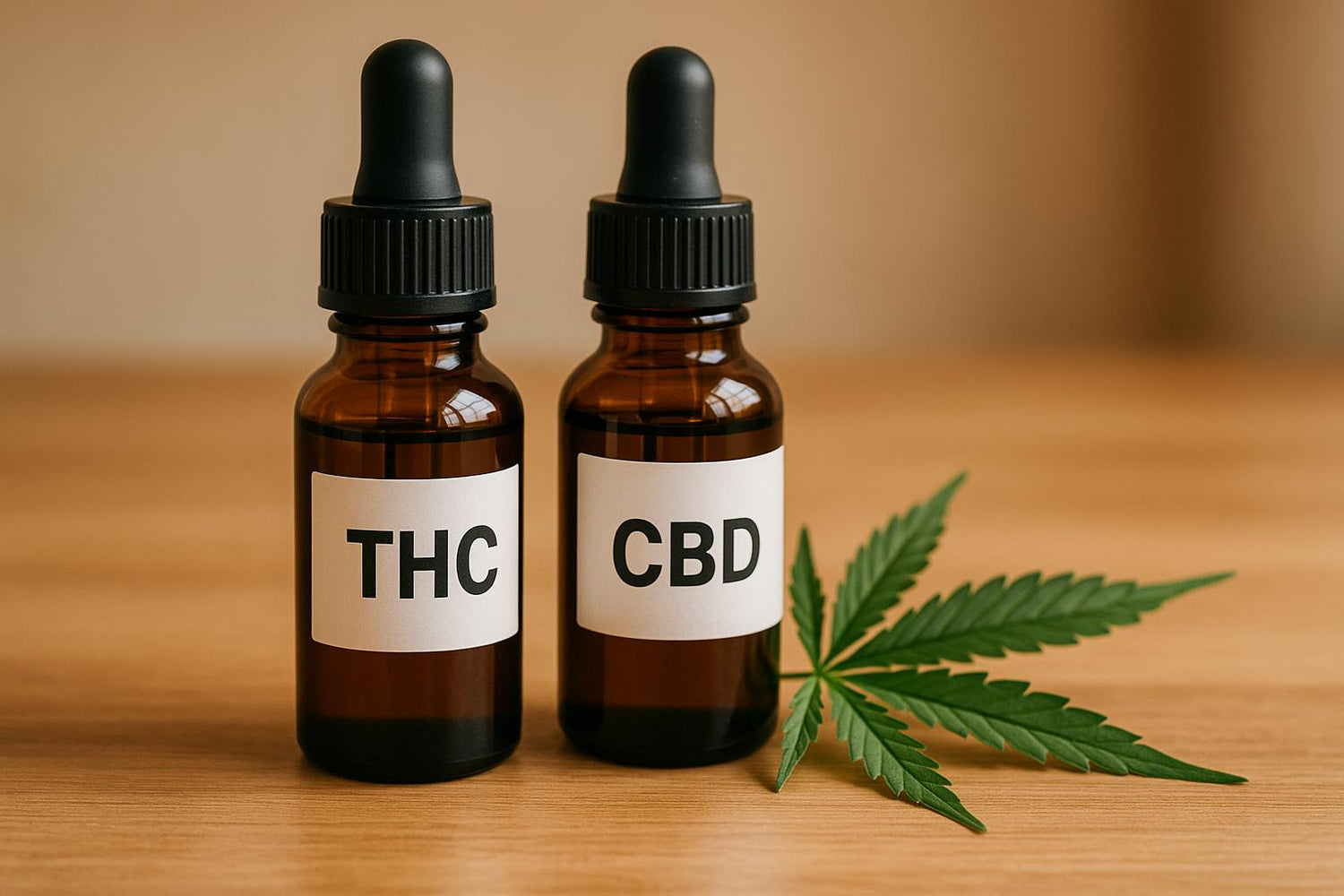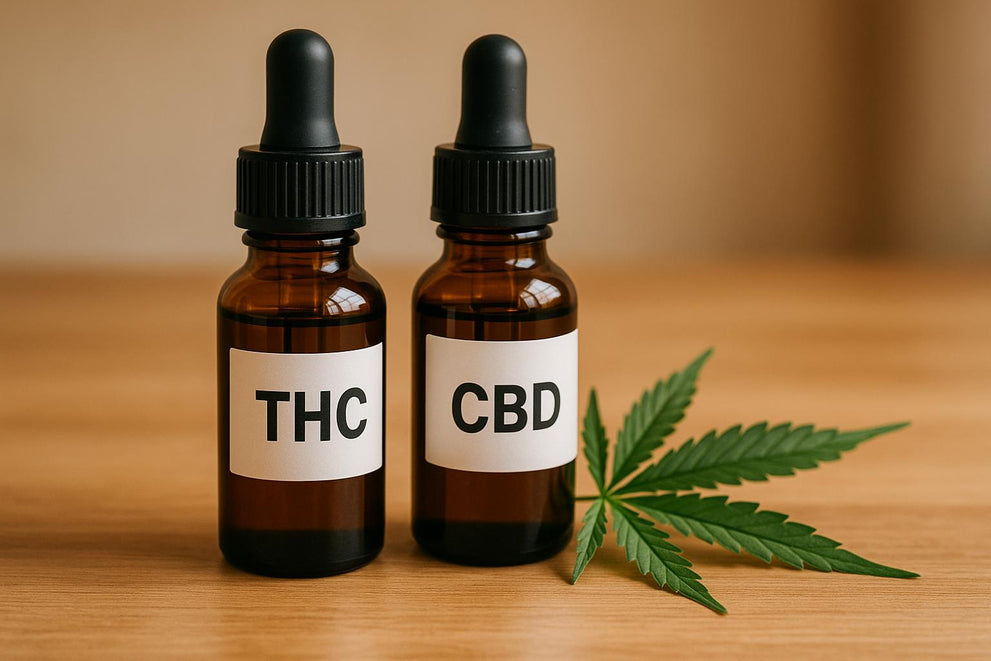THC and CBD interact with your body's endocannabinoid system to influence stress and emotional balance. THC often delivers quick relaxation or euphoria but may lead to tolerance and dependency with regular use. CBD, on the other hand, provides subtle stress relief without psychoactive effects, supporting long-term emotional regulation. Both compounds can be combined for enhanced effects, with CBD tempering THC's intensity.
Key takeaways:
- THC binds to CB1 receptors, offering immediate stress relief but risks tolerance.
- CBD works indirectly, enhancing serotonin signaling and reducing brain inflammation.
- Delta-8 THC is a milder alternative to Delta-9 THC, offering relaxation with less anxiety risk.
- CBD doesn't cause dependency and maintains consistent effects over time.
- Product type, dosage, and individual factors, like genetics, shape your experience.
For tailored stress management, consider combining THC and CBD or choosing products based on your needs. Gummies provide long-lasting effects, while vapes act faster. Always opt for lab-tested products for safety and consistency.
The Effects of Cannabis (Marijuana) on the Brain & Body | Huberman Lab Podcast #92
How THC and CBD Work in Your Body to Reduce Stress
Your body’s endocannabinoid system, which includes CB1 and CB2 receptors, plays a key role in managing stress. CB1 receptors are primarily found in the brain, while CB2 receptors are more concentrated in the immune system and various organs. When cannabinoids interact with these receptors, they influence how your body processes stress and how you emotionally respond to tough situations. With this foundation in mind, let’s dive into how THC and CBD each contribute to stress relief.
How THC Changes Your Behavior
THC directly binds to CB1 receptors in your brain, creating the psychoactive effects it’s known for - like relaxation, euphoria, or shifts in how you perceive time and stress. This interaction alters neural signaling, which can help you step back from overwhelming situations and see them from a different angle. For many, this leads to a reduced stress response, making challenges feel more manageable.
However, there’s a catch. Regular THC use can lead to tolerance. Over time, your brain may produce fewer natural endocannabinoids, relying more on the external supply. This means you might need higher doses to achieve the same calming effects, and you could feel more stressed when not using THC.
For those seeking gentler effects, Delta-8 THC may be a better option. It offers relaxation and anxiety relief without the intense psychoactive high associated with Delta-9 THC, making it a popular choice for milder stress relief.
How CBD Controls Your Stress Response
Unlike THC, CBD doesn’t bind directly to cannabinoid receptors. Instead, it works in a more indirect way, influencing the system without causing psychoactive effects.
One of CBD’s standout features is its interaction with serotonin receptors. Serotonin, often called the "happiness chemical", plays a significant role in regulating mood. By enhancing serotonin signaling, CBD promotes a sense of calm and emotional balance.
Beyond this, CBD has anti-inflammatory properties that extend to the brain. Chronic stress can lead to inflammation in the brain, which worsens anxiety and makes coping with stress harder. By reducing this neuroinflammation, CBD helps restore your brain’s natural ability to manage stress effectively.
Another advantage of CBD is that it doesn’t lead to tolerance. Many people can stick to the same dosage over time and continue experiencing consistent stress-relieving benefits, making it a solid choice for long-term stress management.
The Entourage Effect for Stress Management
When THC and CBD are used together, along with other cannabis compounds like terpenes, they can create what’s known as the entourage effect. This synergy often results in more balanced and effective stress relief compared to using either compound on its own.
For instance, CBD can temper some of the more intense effects of THC, like anxiety or impairment. This combination often leads to a calmer, more "clear-headed" form of relaxation.
Terpenes - the aromatic compounds in cannabis - add another dimension to this effect. Different terpenes can influence how cannabinoids interact with your body. For example, myrcene is linked to sedative effects, while limonene may help lift your mood and ease anxiety.
Products that carefully balance THC, CBD, and specific terpenes can be tailored to meet different stress-related needs. Some formulations are designed for daytime focus, while others are better suited for evening relaxation.
To make the most of the entourage effect, it’s important to choose products with consistent cannabinoid profiles that align with your stress management goals. Lab-tested products are especially valuable because they provide transparency about the exact compounds and concentrations, helping you find the right fit for your needs.
THC vs CBD: Different Effects on Behavior
Both THC and CBD offer stress relief, but they operate differently and bring about distinct changes in behavior. Knowing how they differ can help you decide which option aligns best with your stress management needs.
Immediate Effects on Stress and Emotions
THC acts quickly, often delivering a noticeable shift in mental state. Stress may feel like it melts away, time can seem to slow down, and worries may fade into the background. However, the effects of THC can vary widely depending on the dose and your surroundings. For example, higher doses or Delta-9 THC might actually increase anxiety in some cases. This psychoactive property can be useful for moments when you need to mentally detach from a stressful situation.
On the other hand, CBD offers a more gradual and subtle sense of calm, typically taking 30 to 60 minutes to take effect. Unlike THC, it doesn’t alter your mental clarity, making it a good choice for situations where you need to stay focused - think work presentations or challenging conversations.
The main distinction here is that CBD keeps your cognitive abilities intact while reducing stress, whereas THC induces a more noticeable mental shift. For managing stress during the day, CBD is often more practical. THC, however, might be better suited for unwinding in the evening when staying alert isn’t a priority.
Long-Term Behavioral Changes
The long-term effects of regular use also differ significantly between THC and CBD.
Frequent THC use can lead to dependency, as your brain starts relying on external cannabinoids to handle stress. Over time, this can diminish your natural ability to manage stress and might even affect motivation and emotional resilience. Many long-term users report that handling stress without THC becomes increasingly challenging.
In contrast, CBD tends to work alongside your body’s natural stress response. Regular CBD use often supports emotional balance, helping users become more resilient to everyday stressors. It doesn’t replace your natural coping mechanisms but rather enhances them, promoting better emotional regulation over time.
Additionally, CBD’s anti-inflammatory properties may play a role in improving long-term stress management. By consistently reducing inflammation in the brain, CBD could help restore your body’s natural ability to handle stress more effectively.
THC vs CBD Comparison Table for Stress Relief
| Factor | THC | CBD |
|---|---|---|
| Onset Time | 5-30 minutes | 30-60 minutes |
| Psychoactive Effects | Yes, mental changes | No, maintains clarity |
| Tolerance Development | High, requires increasing doses | Low, consistent effects |
| Best for Acute Stress | Effective but unpredictable | Gentle, reliable relief |
| Workplace Suitability | Not recommended | Generally suitable |
| Sleep Impact | Can cause drowsiness | Promotes relaxation |
| Anxiety Risk | May increase anxiety | Rarely causes anxiety |
| Long-term Dependency | Moderate to high risk | Very low risk |
| Cognitive Function | Temporarily impaired | Maintained or improved |
| Legal Considerations | Varies by state and THC type | Federally legal when hemp-derived |
These differences allow users to tailor their choice based on their lifestyle and stress management needs. For example, Delta-8 THC offers a middle ground, with milder psychoactive effects than Delta-9 THC but still providing a sense of relaxation that some people prefer over CBD alone.
Ultimately, deciding between THC and CBD depends on your specific stress patterns and daily routine. Products like those from Diet Smoke offer formulations that can further guide your choice.
sbb-itb-0d19bd1
What Affects How You Respond to THC and CBD
How THC and CBD affect you can vary widely, depending on factors like dosage, frequency of use, product type, and even your genetics. Let’s dive into how these elements shape your experience.
Dosage and Frequency of Use
If you’re new to THC, even a small dose can produce noticeable effects. But for regular users, tolerance can build over time, meaning higher doses may be needed to achieve the same results. This tolerance is specific to THC and can lead to mild withdrawal symptoms if you stop using it. CBD, on the other hand, doesn’t typically lead to tolerance, and its effectiveness tends to remain steady even with regular use.
Product Types and Cannabinoid Content
The type of product you choose and its cannabinoid concentration also play a big role in your experience. For example, Delta-9 THC is well-known for its strong psychoactive effects, while Delta-8 THC offers a milder alternative with less risk of anxiety.
CBD products come in two main forms: full-spectrum and isolates. Full-spectrum products include trace amounts of THC and terpenes, which work together to enhance effects through what’s known as the entourage effect. Isolates, on the other hand, contain only CBD, offering a more straightforward and predictable option.
How you consume these products matters, too. Inhalable options like vapes or pre-rolls work quickly, making them ideal for immediate stress relief. Edibles, such as gummies, take longer to kick in but provide effects that last much longer. Some products even combine CBD with functional mushrooms, creating unique blends that promote focus and relaxation.
The ratio of cannabinoids in a product can also influence its impact. Balanced formulations are often better for managing mood and anxiety, as they provide steadier, more even effects.
Personal Factors and Genetics
Your genetics can significantly influence how your body processes THC and CBD. Variations in metabolism and sensitivity can determine how effective these compounds are at reducing stress. Other personal factors - like your body weight, overall metabolism, and lifestyle choices - further shape your response.
Medications you’re taking may also interact with cannabinoids, altering their effects. And if you’ve used cannabis before, your prior experiences can influence how you react now. These individual differences play a big part in your overall response and how THC and CBD fit into your long-term habits.
Diet Smoke Products for Stress Relief and Behavioral Balance

Diet Smoke offers a range of THC and CBD products designed to support stress relief and emotional balance. These products aim to provide both immediate comfort and long-term stress management, building on the known benefits of cannabinoids.
Delta-8 THC and Delta-9 THC Options
Diet Smoke's THC products come in different strengths to suit your needs. For those seeking noticeable stress relief, Delta-9 THC options like Cherry Lime Gummies ($39.00) and Fireworks Gummies ($65.00) offer effects ranging from a balanced calm to a more euphoric experience.
If you're looking for something gentler, Delta-8 THC products deliver effective relief without being overwhelming. For instance, the Blue Dream Disposable Vape ($65.00) provides fast-acting, uplifting support.
CBD and Mushroom Gummies
Diet Smoke's CBD gummies are perfect for steady, non-intoxicating stress relief and can even help improve sleep quality. For a unique blend, the Amanita Gummies ($49.00) combine medium THC levels with mushroom extracts to create a balanced, calming experience. Meanwhile, the Grape Sleep Gummies ($32.00) are specially formulated with mild THC to encourage restful sleep.
Quality Assurance and Convenience
Every Diet Smoke product undergoes rigorous lab testing to ensure potency and purity. These products are federally legal, require no medical card, and are shipped discreetly to your doorstep. Plus, with a 100% lifetime happiness guarantee, you can trust you're investing in a dependable solution for managing stress.
Conclusion: Choosing the Right Approach for Behavioral Changes
When it comes to managing stress through behavioral changes, understanding the effects of THC and CBD is key. THC often delivers a quick sense of euphoria, while CBD provides a calming effect without the intoxication. The trick is finding products that suit your lifestyle and needs.
Personalizing your dosage and product choice is just as important. Everyone reacts differently based on factors like dosage, frequency of use, product type, and genetics. A good starting point? Begin with a low dose and gradually adjust to align with your stress levels and daily routine. For rapid stress relief, fast-acting vapes might be your go-to, while gummies offer a longer-lasting, steady effect that some may prefer for all-day support.
Your goals should guide your product selection. For quick relief without feeling impaired, CBD products can provide consistent, day-long support. On the other hand, Delta-8 and Delta-9 products, like those from Diet Smoke, offer a euphoric way to ease stress. If you’re looking for a balanced approach, a mix of THC and CBD can deliver both immediate comfort and sustained stress relief without overwhelming psychoactive effects.
Keep in mind, behavioral changes don’t happen overnight. Your body’s endocannabinoid system may take weeks - or even months - to fully adapt. Tracking how different products affect your stress, sleep, and overall mood can help you fine-tune your approach.
Lastly, always opt for lab-tested products to ensure consistent potency and purity. High-quality options not only enhance effectiveness but also ensure safety, making them a crucial part of your stress management strategy. With the right combination of products and a little patience, THC and CBD can become reliable tools for achieving emotional balance.
FAQs
How do THC and CBD work together to promote stress relief without causing strong psychoactive effects?
THC and CBD work together in a phenomenon called the entourage effect, where their combined impact amplifies stress relief. CBD plays a key role in moderating the psychoactive effects of THC, helping to reduce the likelihood of side effects like anxiety while still encouraging relaxation and a sense of calm.
When used in balanced ratios, such as 1:1 or 2:1 CBD to THC, the combination can deliver stress relief without overly intense psychoactivity. Additionally, CBD interacts with serotonin receptors in the brain, further promoting calmness and aiding in stress management. This partnership creates a smoother, more controlled, and relaxing experience.
How do THC and CBD affect behavior over time when used for stress relief?
Over time, using THC for stress relief can sometimes lead to challenges like increased risks of depression, anxiety, cognitive issues, and, in some cases, even psychosis. These effects stem from the way THC interacts with the brain's systems responsible for reward and stress response.
In contrast, CBD appears to have a more favorable long-term profile. Studies indicate that it may help reduce stress and anxiety without the mental health concerns often tied to THC. That said, while CBD is generally well-received, researchers are still examining its long-term impact.
If you're considering THC or CBD for managing stress, it's crucial to prioritize quality. Look for reliable products from reputable sources. Options such as Delta-8 THC, Delta-9 THC, and CBD gummies offer different ways to promote relaxation and maintain balance.
How do genetics and lifestyle choices influence my experience with THC and CBD?
Your experience with THC and CBD can differ widely depending on genetics and lifestyle habits. For instance, genetic variations - like those in enzymes such as CYP2C9 - play a role in how your body metabolizes THC, which can influence both the intensity and duration of its effects. On the other hand, lifestyle factors, such as how frequently you use cannabis products or your exposure to certain environmental conditions, can shape how your body responds over time. These interactions might even impact areas like mood, stress levels, and cognitive performance.
Since every individual’s body reacts differently, understanding these dynamics can help you personalize your approach to THC and CBD use. To achieve a consistent and enjoyable experience, you might want to explore high-quality products tailored to specific goals, whether you're seeking relaxation, focus, or something in between.





